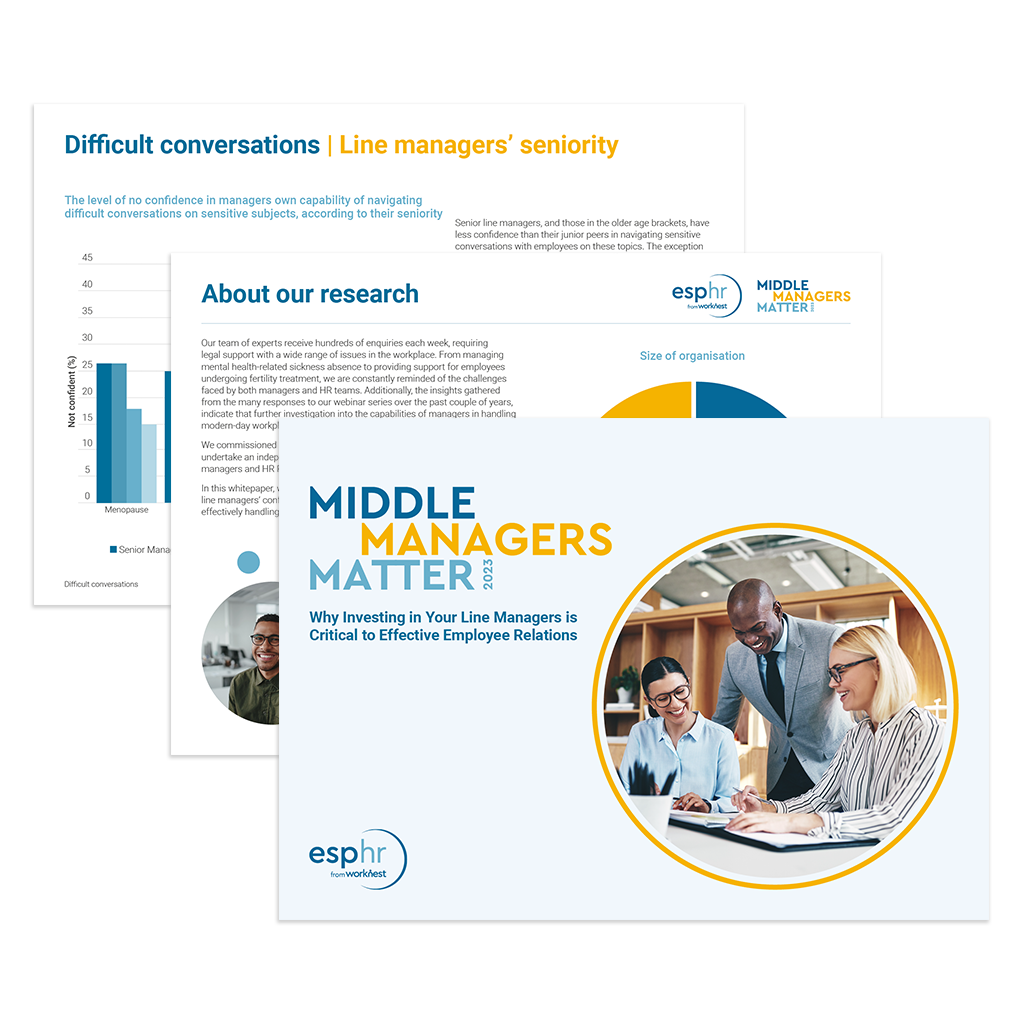In our national research, we set out to identify the characteristics of the most confident line manager in the UK. Our findings suggest that a full-time male employee, aged 35-44, working in the North East of England for a large technology business, epitomises the most confident line manager in the UK. This profile emerged from and extensive survey involving over 700 line managers, exploring their confidence level across various workplace matters.
The confident line manager profile
- Male
- Full-time employment
- Based in the North East
- Employed in the IT and technology sector
- Aged 35 to 44
- Works in a large company with 3,500 to 4,999 employees
- Heads a team with 11 to 20 direct reports, primarily engaged in hybrid work
The least confident manager profile
- Female
- Part-time employment
- Based in the North West
- Employed in the charity sector
- Aged 55 to 64
- Works in an organisation totalling 500 to 999 employees
- Senior managers with 6 to 10 direct reports
Managerial confidence: A balancing act
While our research paints a picture of the ideal line manager, it also sheds light on the challenges they face and their levels of confidence in handling common tasks such as absence management and rewards and recognition, to more complex and sensitive issues such as neurodiversity and harassment.
Sarah Dillon, Director of Legal and ER at esphr, said: “Line managers across the board need support from their organisation to fulfil the role confidently. We’re seeing varying degrees of both belief in their ability and the levels of training being provided across different demographics.
“The demands of being a line manager are high, and these individuals play a critical role in today’s rapidly changing workplace. They’re often moving from mate to manager, and will have diverse team members with different needs. Many will have to support hybrid and remote workers. Moreover, they deal with a significant range of employee relations issues, including the most sensitive topics, whilst still having their own role to carry out and targets to hit.
“With radical changes to working life over the past few years, many organisations haven’t had the bandwidth to provide the necessary support to this cohort, which is evidenced by our research.”
Confidence in having sensitive conversations
In the modern-day workplace, previously taboo subjects are now openly discussed with management, fostering positive work environments.
However, our research reveals that line managers still struggle with discussing certain sensitive topics, particularly gender identity, fertility and the menopause, which could disproportionately affect women in the workplace.
Confidence levels in discussing sensitive topics.
Those line managers surveyed were asked about their confidence in handling particular sensitive topics. The findings reveal that while approximately three-quarters feel confident addressing the subject of race, just over half express the same confidence when it comes to fertility.
- Race (74%)
- Death of a relative or friend (70%)
- Religion (70%)
- Severe illness (69%)
- Harassment (69%)
- Disability (physical or invisible) (63%)
- Neurodiversity (61%)
- Gender identity (61%)
- Menopause (58%)
- Fertility (56%)
Age disparities in confidence levels
Age seems to play a significant role in confidence levels, with one-third (32%) of individuals aged 55–64 lacking confidence in discussing fertility, compared to only 16% of those aged 18–24.
The significance of having managers who can support team members through fertility challenges cannot be overstated. According to CIPD research, nearly one in five employees has considered leaving their job due to their experience at work in relation to fertility challenges, investigations, or treatment.
Challenges in menopause discussions
Concerning menopause discussions, over a quarter of male line managers admit to lacking confidence, yet the levels of confidence in discussing fertility issues are almost the same for both male and female managers (55% of men express confidence compared to 58% of women). Managers within the 35–44 are least confident in navigating conversations on this topic.
Disparities also emerge in the ability to confidently address sensitive topics beyond reproductive health. Older line managers (aged 55-65) are significantly less confident in conducting conversations around gender identity and neurodiversity, while male line managers, aged 18-24 and 35-44, feel most confident supporting those team members who have a neurodiversity.
Senior managers vs. junior counterparts
Furthermore, senior managers have less confidence in their capabilities compared to their junior counterparts. This discrepancy may stem from the fact that senior managers may have gained their experience before significant changes in employment laws or best practices occurred, leading to a perception of being less up to-date in these areas.
Training across the ages
Interestingly, our research highlights disparities in training across different age groups. A significantly higher number of the youngest line managers (33%) report more thorough questioning during the interview process on their capabilities to handle sensitive subjects compared to their older counterparts (14% aged 55-64).
- Younger managers (33%) receive more thorough questioning on handling sensitive subjects during interviews
- Senior managers (aged 55-64) less likely to receive training on approaching sensitive conversations
Sarah Dillon said: “When considering age brackets, as well as levels of seniority, it’s important not to assume that everyone has the same level of understanding and capability to deal with employee relations issues. Our findings reveal that senior managers, and those who are in the older age brackets, can in fact be less confident in navigating difficult conversations than their younger, and more junior peers. They are more likely to have received training on standard people management issues but are the group least likely to have had any training on approaching sensitive conversations.”
The younger generation, who have entered the job market more recently, appear to have had training that reflects the modern workplace and started in their careers at a time when more emphasis is put on inclusivity.
Sarah added: “By recognising the value of diverse perspectives and skill sets, organisations can harness the full potential of their workforce, creating an environment that thrives on a harmonious
blend of experience, fresh insights, and innovative thinking.”
To read the full report and delve into the findings in more detail, download the Middle Managers Matter whitepaper here.




